

Organization of the Mafia - Organized Crime in the 1920s. Organized Crime in the 1920’s and Prohibition. Written by Tim Nash Crime - 20th Century Crime Organized Crime in the 1920’s - Prohibition What a time the 1920’s was, with the party atmosphere it was certainly a time of great criminal activity, with the prohibition laws in America and the world in an economic depression.
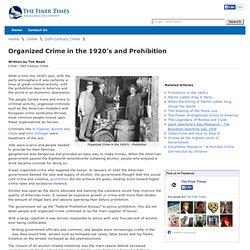
The people turned more and more to criminal activity, organized criminals such as the American mobsters and European crime syndicates thrived, most common people looked upon these organizations as heroes. Criminals like Al Capone, Bonnie and Clyde and John Dillinger were headliners of the era. Jobs were scarce and people needed to provide for their families, gangsterism was dangerous but provided an easy way to make money. It was organized crime who supplied the booze.
Alcohol was seen as the devils advocate and banning the substance would help improve the quality of American lives. With a large coastline it was almost impossible to police with only five percent of alcohol ever being confiscated. Like this article? Google + Sex Trafficking in the U.S. Thousands of brothels in the U.S. operate under the guise of legitimate massage parlors.
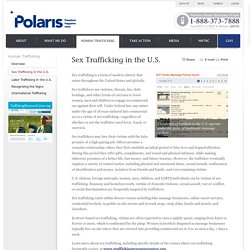
Traffickers sell women and children online everyday. Curtains are used to divide rooms in residential brothels, where women are forced to engage in commercial sex. Pimps use violence and coercion to commercially sexually exploit young women. Young girls are forced to sell sex by knocking on cab doors at truck stops. Prostituted individuals are forced to make hundreds of dollars in nightly quotas to be given to their traffickers.
Organized crime. Sex Trafficking. Organized crime. 20th century American mobster Al Capone, a figure often associated with the topic of organized crime.
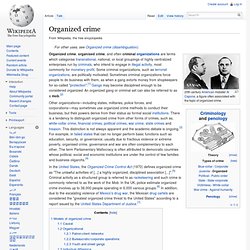
Annual_report_2007_e. And Money-Laundering/Countering the Financing of Terrorism. English | Français The Law Enforcement, Organized Crime and Anti-Money-Laundering Unit of UNODC is responsible for carrying out the Global Programme against Money-Laundering, Proceeds of Crime and the Financing of Terrorism, which was established in 1997 in response to the mandate given to UNODC through the United Nations Convention against Illicit Traffic in Narcotic Drugs and Psychotropic Substances of 1988.
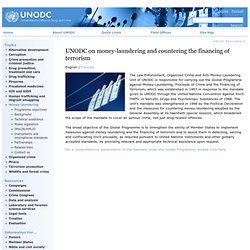
The Unit's mandate was strengthened in 1998 by the Political Declaration and the measures for countering money-laundering adopted by the General Assembly at its twentieth special session, which broadened the scope of the mandate to cover all serious crime, not just drug-related offences. For a comprehensive presentation of the mandate under the Global Programme, please click here. Organized Crime: Background and Definitions. What is Organized Crime?
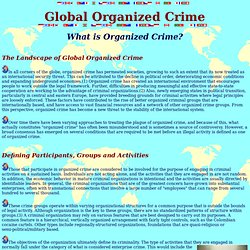
The Landscape of Global Organized Crime In all corners of the globe, organized crime has permeated societies, growing to such an extent that its now treated as an international security threat. This can be attributed to the decline in political order, deteriorating economic conditions and expanding underground economies.(1) Organized crime has created an international environment that encourages people to work outside the legal framework. Further, difficulties in producing meaningful and effective state-to-state cooperation are working to the advantage of criminal organizations.(2) Also, newly emerging states in political transition, particularly in central and eastern Europe, have provided breeding grounds for criminal activities where legal principles are loosely enforced.
Defining Participants, Groups and Activities Those that participate in organized crime are considered to be involved for the purpose of engaging in criminal activities on a sustained basis. Organized crime. 20th century American mobster Al Capone, a figure often associated with the topic of organized crime.
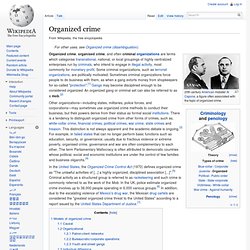
Other organizations—including states, militaries, police forces, and corporations—may sometimes use organized crime methods to conduct their business, but their powers derive from their status as formal social institutions. There is a tendency to distinguish organized crime from other forms of crimes, such as, white-collar crime, financial crimes, political crimes, war crime, state crimes and treason. This distinction is not always apparent and the academic debate is ongoing.[3] For example, in failed states that can no longer perform basic functions such as education, security, or governance, usually due to fractious violence or extreme poverty, organised crime, governance and war are often complementary to each other. Models of organized crime[edit] Causal[edit] Organized Crime.
Organized crime may be defined as systematically unlawful activity for profit on a city-wide, interstate, and even international scale.

The corporate criminal organization is a far cry from the small-scale predations of a Bonnie and Clyde. Criminal organizations keep their illegal operations secret, and members confer by word of mouth. Gangs sometimes become sufficiently systematic to be called organized. The act of engaging in criminal activity as a structured group is referred to in the United States as racketeering.
A criminal organization depends in part on support from the society in which it exists. Labor racketeering is a general term for the misuse of organized labor for criminal purposes. The Teamsters Union, under leaders Dave Beck and James R. The Mafia Criminal organizations sometimes arise in closely knit immigrant groups that do not trust the local police and other authorities.
Midway through the 20th century, Mafia influence crested in the United States. U.S. Organized Crime. English | Français.
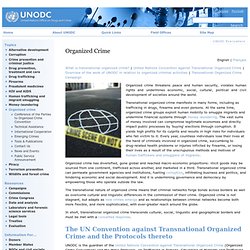
Organized crime. 20th century American mobster Al Capone, a figure often associated with the topic of organized crime. Other organizations—including states, militaries, police forces, and corporations—may sometimes use organized crime methods to conduct their business, but their powers derive from their status as formal social institutions. There is a tendency to distinguish organized crime from other forms of crimes, such as, white-collar crime, financial crimes, political crimes, war crime, state crimes and treason.
This distinction is not always apparent and the academic debate is ongoing.[3] For example, in failed states that can no longer perform basic functions such as education, security, or governance, usually due to fractious violence or extreme poverty, organised crime, governance and war are often complementary to each other. Models of organized crime[edit] Causal[edit] Organizational[edit] Patron-client networks[edit] Mafia boss Totò Riina behind bars in court after his arrest in 1993. Organized Crime. The Mafia and American Law: A History of Organized Crime. Organized crime in America comes in many forms, but it was the Mafia that emerged with the highest profile and helped spur numerous acts of Congress to help law enforcers deal with the threat.
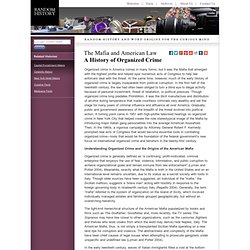
R41547. Connecticut's Organized Crime and Racism History. One of the original enforcers of Connecticut's "Whites Only" unofficial policies: Mr.
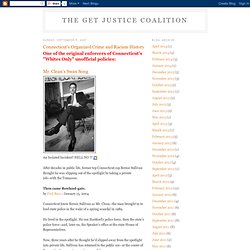
Clean's Swan Song. What Is Organized Crime? (with picture) The Day - Google News Archive Search. Abstract - National Criminal Justice Reference Service. Tools Advanced Search Search Help Menu Home / Publications / NCJRS Abstract NCJRS Abstract The document referenced below is part of the NCJRS Library collection. Office of Justice Programs Contact Us | Feedback | Site MapFreedom of Information Act | Privacy Statement | Legal Policies and DisclaimersUSA.gov | CrimeSolutions.govDepartment of Justice | Office of Justice Programs. Newswallah: Bollywood and Organized Crime. Rafiq Maqbool/Associated PressSanjay Dutt flanked by his sister, Priya Dutt, broke down during a press conference in Mumbai, Maharashtra, on Thursday. MUMBAI— The actor Sanjay Dutt, who was sentenced last week to five years in prison for illegal possession of weapons supplied by the masterminds of the 1993 Mumbai bombings, has accepted his sentence and will not apply for a pardon, he said Thursday.
“Just let me be in peace till I surrender,” he begged reporters gathered outside his Mumbai residence. Mr. Dutt was accompanied by his sister, Priya Dutt, a Congress Party member of parliament. Mr. While ganglords allegedly finance Bollywood blockbuster movies and use the film industry to launder black money, Bollywood actors have complained openly of receiving threats from underworld gangsters. Bollywood’s connection to the underworld can be traced back to a government regulation that made the film industry ineligible for bank credit, private equity and other legitimate commercial financing.